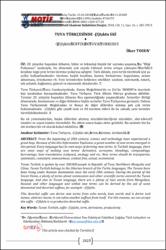| dc.contributor.author | Tosun, İlker | |
| dc.date.accessioned | 2021-12-12T16:49:30Z | |
| dc.date.available | 2021-12-12T16:49:30Z | |
| dc.date.issued | 2018 | |
| dc.identifier.issn | 1308-4445 | |
| dc.identifier.uri | https://doi.org/10.12981/mahder.473627 | |
| dc.identifier.uri | https://app.trdizin.gov.tr/makale/TXpJMk56azJOZz09 | |
| dc.identifier.uri | https://hdl.handle.net/20.500.11857/1983 | |
| dc.description.abstract | 20. yüzyılın başından itibaren, bilim ve teknoloji büyük bir sıçrama yaşamış, bu “BilgiPatlaması” nedeniyle, bu dönemde çok sayıda bilimsel terim ortaya çıkmıştır. Her dil,kendine özgü yeni terim türetme yollarına sahiptir. Türk dilinde, yeni terim türetmek için şuyollar kullanılmaktadır: türetme, başlık kısaltma, karma, birleştirme, kopyalama, anlamaktarması, örnekseme vb. Yeni terimlerden beklenen nitelikler saydam, sistematik, tutarlı,tek anlamlı, bağlamsız, güncel ve ekonomik olmalarıdır.Tuva Türkçesi; Tuva Cumhuriyetinde, Kuzey Moğolistan’da ve Çin’de 300000’in üzerindekişi tarafından konuşulmaktadır. Tuva Türkçesi, Türk dilinin Sibirya grubuna dâhildir.Tuvalar 20. yüzyılın başından itibaren Rus egemenliğinde yaşamaktadır. Sovyetler Birliğidöneminde, komünizme ve diğer bilimlere ilişkin terimler Tuva Türkçesine girmiştir. DahasıTuva Türkçesinde Moğolcadan ve Rusça ile diğer dillerden alınmış pek çok terimbulunmaktadır. –(I)IşkIn gibi çeşitli isim ve fiil türetme ekleri ile bu sahada yeni terimlertüretilebilmektedir.Bu ek yansımalardan, başka dillerden alınmış sözcüklerden yeni sözcükler; alet-edevatisimleri ve soyut isimler türetebilir. Bu ekten sonra başka ekler gelebilir. Bu nedenle biz bueki üretken bir ek olarak kabul edebiliriz. | en_US |
| dc.description.abstract | From the beginning of 20th century, science and technology have experienced a great leap. Because of the this Information Explosion, a great number of new terms emerged in this period. Every language has its own ways of deriving new terms. In Turkish language, there are some ways of making new terms: derivation, acronyms, blendings, compundings, borrowings, loan translations (calques), analogy and etc. New terms should be transparent, systematic, consistent, monosemous, context free, actual, economical. Tuvan Turkish is spoken by over 300.000 people in Republic of Tuva, Northhern Mongolia and China. Tuvan Turkish belongs to the Siberian branch of the Turkic languages. The Tuvans have been living under Russian domination since the early 20th century. During the period of the Soviet Union, a plenty of terms about communism and other scientific terms entered the Tuvan language. And also In Tuvan language, there are a plenty of loan words from Mongolian, Russian and other languages and withal new terms can be derived by the aid of some denominal and deverbal suffixes, for example –(I)IşkIn. This deverbal suffix can derive new terms from echo words, loan words and it derive tool names, abstract nouns; it can takes another suffixes from itself. For this reasons, we can accept the suffix –(I)IşkIn is so productive deverbal suffix. | en_US |
| dc.language.iso | tur | en_US |
| dc.relation.ispartof | Motif Akademi Halkbilimi Dergisi | en_US |
| dc.identifier.doi | 10.12981/mahder.473627 | |
| dc.rights | info:eu-repo/semantics/openAccess | en_US |
| dc.subject | Kültürel Çalışmalar | en_US |
| dc.subject | Folklor | en_US |
| dc.title | TUVA TÜRKÇESİNDE -(I)IşkIn EKİ | en_US |
| dc.title.alternative | (I)IşkIn SUFFIX IN TUVA TURKISH | en_US |
| dc.type | article | |
| dc.department | Fakülteler, Fen-Edebiyat Fakültesi, Çağdaş Türk Lehçeleri ve Edebiyatları Bölümü | |
| dc.identifier.volume | 11 | en_US |
| dc.identifier.startpage | 282 | en_US |
| dc.identifier.issue | 24 | en_US |
| dc.identifier.endpage | 295 | en_US |
| dc.relation.publicationcategory | Makale - Ulusal Hakemli Dergi - Kurum Öğretim Elemanı | en_US |
| dc.institutionauthor | Tosun, İlker | |



















